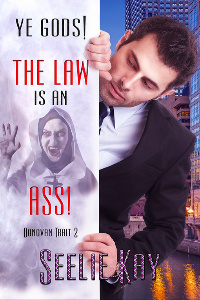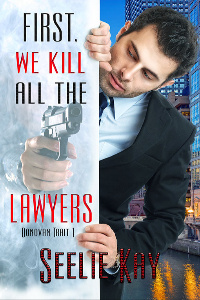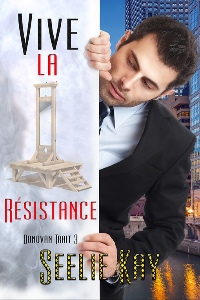In First, We Kill All the Lawyers, vampire lawyer Donovan Trait survived repeated attacks by a serial killer. Now, after violating a marital agreement with the Vampire Coalition, and several ancient Vampire Laws, Donovan, and his newly-turned vampire bride are on the run. You see, in exchange for permitting a pure-blood vampire to marry a turned human, the Traits agreed to allow vampire scientists to monitor the conception and birth of their children. When Judge Shirley Magnusen Trait turns up accidentally pregnant on her wedding day, the fury of the Coalition is unleashed. The tribunal recommends unacceptable punitive action and the Traits are forced to flee to a mysterious island of vampire nuns. The Traits are, by profession, seekers of the truth. But this time, the truth may not set them free. In fact, it could start a revolution. Will the Traits escape the clutches of the Coalition and keep their babies safe? Or will their family be…eliminated?

Donovan Trait pivoted and scowled.
“You have the audacity to claim you bear no liability for your actions? You skimped on the smoke alarms and sprinklers and failed to install the required number of fire extinguishers in the apartment building formerly at Three Zero Two West Michigan Avenue. When a fire erupted in the middle of the night as a result of faulty wiring, my clients—eight entire families—were left homeless. Fourteen people were hospitalized. How can you possibly deny fault?”
“Objection, Your Honor. Counsel is badgering the witness!” The defense attorney stood and planted his hands on his hips.
Judge Hillary Lord’s bright red lips curved up into a cruel smile. “Actually, I have been admiring Counselor Trait’s restraint. Motion denied.” She narrowed her eyes and gazed at the witness. “Please answer the question, Mr. Livingston.”
The witness glared at Donovan. “Because I didn’t know that the smoke alarms and sprinklers were faulty.” The man’s voice grew strident. “I was told everything was up to code. That the building passed all inspections. I have the reports. There is no indication anywhere that the building was not in compliance. I can’t fix what I don’t know.” The middle-aged owner sat back in the witness chair and a self-satisfied smile crossed his face.
Donovan studied the man. He looked every inch a pretentious, successful businessman. Artfully arranged hair. A freshly shaved face. A tailored suit of fine quality. Shoes bearing the shine of expensive leather. Even his argyle socks screamed money. And his hands. It was clear that this man was a stranger to manual labor. The buff of his most recent manicure was evidence of that. Livingston’s only tell was the almost imperceptible twitch in his right eye.
Not that Donovan needed the twitch to discern that the man was lying. Donovan Trait, one of Chicago’s hottest lawyers—according to Chi Town Magazine—was a vampire. Vampires could read humans like a book. The slight rounding of the pupils, the increased heartbeat, the stiffening of the joints. All were indications of a lie. The best actors in the world could not escape the laser focus of a vampire. After all, vampires were closer to humans than any other species.
The only real difference occurred in the genetic code. Through a twist of cruel fate—for humans—a vampire’s senses were greatly enhanced and enabled them to detect even the slightest physiological changes in humans. Of course, that was not the only genetic anomaly. Vampires also had fangs—those pesky lateral incisors that emerged in times of anger or overwhelming sexual arousal—and an unfortunate lust for human blood. Thankfully, centuries of evolution had provided the Vampire Nation with the gift of control. They no longer needed to drain the blood of humans to survive. Vampire scientists had developed a pill that quenched that thirst and replaced the nutrients a human had formerly provided.
Vampires were still in the closet to humans, of course, primarily because humans had displayed an unfortunate lack of tolerance for anything that deviated from the norm. The list of horrifying acts perpetuated by humans onto anyone deemed different was long and growing. New controversies surrounding the cross-gendered were the most recent atrocity, but history had proven that what humans feared, they destroyed. The Inquisition, the Salem Witch Trials, and the internment and concentration camps during WWII were all evidence of the resilience of human hate. That meant the introduction of what was considered paranormal—vampires, Weres, fairies, and such—could very well result in persecution and death. So, while vampires existed in the human world, they were loath to expose their origins. The risk was just too great.
Donovan stalked to the plaintiff’s table and picked up a single sheet of paper. He pretended to read it, hiding his annoyance at the witness. Finally, he emitted a dramatic sigh. He turned and strode back to the witness stand. “Mr. Livingston, have you ever seen this?” He handed the paper to the witness and another to the judge.
Livingston pulled out a pair of designer reading glasses and scanned the page. He paled and his lower lip trembled, but he responded, “This appears to be a copy of a check, written on the company account. But I don’t know what it’s for. I’ve never seen it before.”
Donovan cocked an eyebrow to convey his disbelief. “Truly, Mr. Livingston? The check is for one hundred thousand dollars. How, as CEO of Livingston Construction, could you possibly be unaware of such a large amount? Surely, you aren’t in the habit of gifting random people?”
Livingston shook his head. A slight sheen of sweat emerged on his forehead. “I have no earthly idea what this check is for.”
Donovan chuckled. “Mr. Livingston, the check is written to Ronald Santuro. Do you know who that is?”
“I do not.”
“Would it surprise you to learn that he is a clerk in the office of the Cook County Building and Inspections Department?”
Livingston shifted uncomfortably in the witness chair. “Of course, it would. I just said I didn’t know him.” He peered down his nose at Donovan, his glasses now balanced on the very tip of that extremity.
Donovan nodded at the paper Livingston held. “Whose signature is on the check, sir?”
Livingston flushed. “Well, mine. But this is one of those stamp thingies my secretary uses. She signs all of the company checks. That’s her job.”
Donovan grinned—his best gotcha smile. “Your secretary is Barbara Brewer, is it not?”
“Yes. Has been for about fifteen years.”
“Fifteen years? So, you knew her before her marriage to Jonathan Brewer?”
“Well, yes. I attended her wedding. Why does that matter?”
“Because Ronald Santuro is her brother. Her maiden name was Santuro.”
Livingston shrugged. “I did not remember that.” He again peered down his nose at Donovan. “Are you suggesting my secretary has been embezzling funds?” His face screwed up in disdain. “No, that can’t be true.”
Donovan laughed. He turned to the jury and winked. “Actually, your secretary is willing to testify that this check was prepared upon your instruction, signed upon your instruction, and delivered upon your instruction. She will also testify that she contacted her brother upon your instruction and arranged a meeting, at which you offered her brother one hundred thousand dollars to expedite the paperwork for several building projects, including the very apartment building at issue in this lawsuit.”



